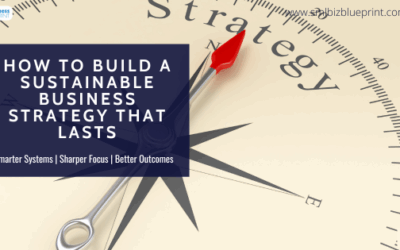As a business owner, it is crucial to recognise that inaction is not an option. If you choose to do nothing, your business will inevitably go backward.
The business landscape constantly evolves, and your competition, both known and unknown, tirelessly works to improve and gain an edge. You risk losing market share, relevance, and competitive advantage by standing still.

Embracing a proactive approach, continuously seeking growth opportunities, and relentlessly striving for improvement is the only way to stay ahead of the competition and drive your business forward.
Scaling a business opens up a world of possibilities for growth, profitability, and impact.
It allows business owners to realise their vision, capitalise on market opportunities, and position their businesses as industry leaders.
By embracing the challenge of scaling and adopting a growth-oriented mindset, business owners can propel their businesses to new heights of success and create a lasting legacy.
Let’s look at what is required to scale a business.
#1 Developing a Scalable Business Model
A strong foundation is crucial for scaling a business.
You create a blueprint for sustainable growth by developing a scalable business model.
A business model is a framework or structure that describes how a company creates, delivers, and captures value.
It encompasses various aspects of a business, including its target customers, value proposition, revenue streams, cost structure, distribution channels, and key partnerships.
A well-designed and effective business model is the foundation for a successful and sustainable business.
It starts with identifying a market gap and crafting a value proposition that resonates with your target audience.
A scalable business model also entails efficient processes, standardised operations, and effective resource allocation.
For example, companies like Tesla disrupted the automotive industry by offering electric vehicles with cutting-edge technology, appealing to environmentally conscious consumers seeking innovative transportation solutions.
#2 Building Scalable Infrastructure
Scaling a business requires a robust infrastructure that can handle increasing demands.
A scalable infrastructure refers to the underlying systems, technologies, and resources that can accommodate and support the growth and expansion of a business.
It involves designing and implementing a framework that can handle increased demands in terms of volume and complexity without sacrificing performance, reliability, or efficiency.
A scalable infrastructure enables a business to adapt quickly to changing needs, seize growth opportunities, and maintain operational effectiveness as it expands.
Leveraging cloud computing, scalable technologies, and advanced IT systems allows you to adapt quickly to growth opportunities.
For instance, Amazon’s scalable infrastructure, powered by Amazon Web Services (AWS), enables seamless e-commerce, global logistics, and efficient order fulfilment.
Prioritising cybersecurity and data protection are essential to maintain scalability without compromising sensitive information.

#3 Leveraging Automation and Technology
Automation and technology play a pivotal role in scaling a business.
Leveraging automation and technology for a business involves utilising various tools, software, and processes to automate manual tasks, streamline operations, and enhance overall efficiency.
It allows businesses to optimise productivity, reduce human error, and focus on higher-value activities.
Automation and technology can be applied to various aspects of a business, including operations, marketing, customer service, and data analysis.
Automating repetitive tasks and utilising cutting-edge technologies can enhance efficiency, productivity, and customer experiences.
For example, Netflix’s recommendation algorithm employs machine learning to provide personalised content suggestions, fostering customer loyalty and engagement.
Data analytics also provide valuable insights into market trends, customer behaviour, and operational efficiency, enabling data-driven decision-making.
#4 Strategic Team Building
Building a talented and adaptable team is crucial for scaling a business.
Strategic team building for a business refers to the deliberate process of assembling and developing a team that is aligned with the organisation’s goals, values, and objectives.
It involves selecting individuals with the right skills, expertise, and mindset to contribute to the business’s success.
Strategic team building aims to create a cohesive, high-performing team that drives innovation, productivity, and growth.
Hiring individuals with growth potential and fostering a culture of learning and innovation sets the stage for success.
Google, for instance, identifies candidates with exceptional problem-solving abilities and a passion for innovation, cultivating a culture of excellence and continuous learning.
You can optimise their contributions and drive growth by empowering your team, providing professional development opportunities, and aligning their skills with business objectives.

#5 Scalable Marketing and Sales Strategies
An effective marketing and sales strategy is essential for scaling a business.
Scalable marketing and sales strategies for a business involve designing and implementing approaches that can be expanded and adapted to support the growth and increasing demands of the business.
These strategies aim to reach a wider audience, generate leads, and drive sales while maintaining efficiency and effectiveness.
Leveraging digital marketing channels, such as social media, content marketing, and search engine optimisation (SEO), allows you to reach a wider audience and generate leads.
Dollar Shave Club’s viral video campaign disrupted the shaving industry, rapidly acquiring a vast customer base and transforming how men buy grooming products.
Automation tools also aid in lead generation, customer relationship management (CRM), and personalised marketing campaigns, maximising scalability and customer acquisition.
#6 Customer-Centric Focus
Prioritising customer satisfaction is paramount when scaling a business.
A customer-centric focus for a business means prioritising customers’ needs, preferences, and satisfaction in all aspects of the business’s operations.
It involves understanding and anticipating customer expectations, delivering exceptional experiences, and building long-lasting relationships.
You can create loyal customer relationships and drive organic growth by actively listening to customer feedback and continuously iterating your products or services.
Zappos’ renowned customer service, featuring hassle-free returns and exceptional support, has built a loyal customer base, differentiating the brand in the competitive e-commerce market.
Leveraging data analytics allows for personalised experiences, targeted marketing campaigns, and improved customer retention.

#7 Monitoring Metrics for Success
Monitoring key metrics and analysing data is vital to track progress and identify areas for improvement.
Monitoring metrics for success in a business involves tracking and analysing key performance indicators (KPIs) and data to evaluate the progress, performance, and effectiveness of various business processes and initiatives.
It enables businesses to make data-driven decisions, identify areas for improvement, and ensure alignment with organisational goals.
By measuring revenue, customer acquisition and retention, operational efficiency, and profitability, you gain valuable insights into the effectiveness of your scaling efforts.
Uber’s data-driven approach, analysing driver and rider acquisition costs, average ride fares, and customer ratings optimises operations and delivers a superior user experience.
Visualisation tools and performance dashboards aid in identifying bottlenecks, trends, and growth opportunities.
#8 Building Strategic Partnerships
Strategic partnerships and alliances can propel your business’s scalability.
Building strategic partnerships for a business involves establishing collaborative relationships with other organisations or individuals to achieve mutual goals, enhance capabilities, and create value.
Strategic partnerships can take various forms, including joint ventures, alliances, co-marketing agreements, distribution partnerships, or supplier relationships.
Collaborating with complementary businesses expands your market reach, provides access to new resources, and accelerates growth.
Starbucks’ partnership with Spotify enhances the customer experience by offering personalised music streaming within their stores, creating a unique and captivating ambience.
Joint ventures, distribution partnerships, or licensing agreements enable you to penetrate new markets and leverage existing networks.
Conclusion
Scaling a business requires a combination of strategic vision, execution excellence, and relentless pursuit of growth.
By implementing the keys to scaling outlined in this comprehensive guide, you can position your business for extraordinary success.
Remember to focus on developing a scalable business model, building a robust infrastructure, leveraging automation and technology, cultivating a talented team, adopting scalable marketing and sales strategies, prioritising customer satisfaction, monitoring metrics, and forming strategic partnerships.
Equip yourself with the knowledge and mindset to propel your business forward, seize new opportunities, and establish your dominance in the market.
Embrace scalability and embrace your limitless potential.




